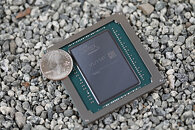Thursday, October 8th 2020

AMD to Enter the FPGA Market, in Advanced Talks to Acquire Xilinx
AMD is planning to enter the FPGA market by buying out one of Intel's largest competitors, Xilinx. The Wall Street Journal reports that AMD is in "advanced talks" to acquire the San Jose-based firm which specializes in FPGAs of all shapes and sizes, including large, high logic cell-count FPGAs under the Virtex UltraScale brand, the main competitor to Intel's Stratix 10. Xilinx is valued at $26 billion, although analysts estimate the AMD acquisition to go down at close to $30 billion, making it one of the largest tech acquisitions of the year, after NVIDIA's buyout of Arm from Softbank. An FPGA lineup would give AMD a near complete portfolio of computing hardware IP: CPUs with x86 and Arm licenses, GPUs, GPU-based scalar compute processors, semi-custom SoCs, low-power media processors, and now FPGA.
Source:
The Wall Street Journal

57 Comments on AMD to Enter the FPGA Market, in Advanced Talks to Acquire Xilinx
I really hope that they don't overpaid it otherwise, they might not even be able to financially recover this time and perish for good.
For x86 but not for ARM.You are right. AMD has the license already. damn :)
AMD isn't Intel yet, they shouldn't shell out billions on companies like it's nothing.
As for why they're looking at this in a broader perspective, I think AMD is seeing significant growth but are also seeing the limits of the X86 CPU + GPU/compute accelerator market, and want to diversify. Makes sense business wise, though there is definitely a need to not over-reach when doing something like this. Buying a company worth between 1/3 and 1/4 of your own? That's defintely a big ask. Though that should also mean buying into a solid source of revenue, of course, and as such it should pay for itself in time even if left to its own devices (as long as the interest on the loans needed to buy isn't egregious).
Given the way Intel has been gobbling up companies left and right for the past decade, I think we need someone else of a similar size to balance things out and avoid Intel entirely cementing themselves as the one-stop-shop for all enterprise compute solutions. (No, I don't think NvidiARM+Mellanox quite does that, as ARM's main business is (still) consumer chips.)